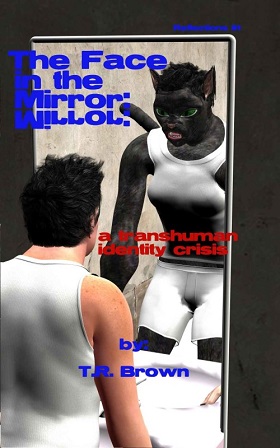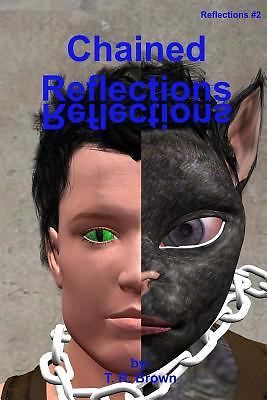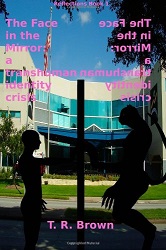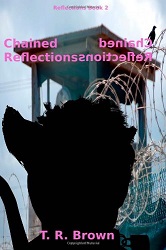Review: 'The Face in the Mirror' and 'Chained Reflections', by T. R. Brown
 These are the first two volumes of T.R. Brown’s Reflections series. Amazon.com has a special subcategory for them: Genetic Engineering Science Fiction. They should be required reading for every furry author who plans to write human-into-anthropomorphized-animal fiction. They are also good reading for everyone else.
These are the first two volumes of T.R. Brown’s Reflections series. Amazon.com has a special subcategory for them: Genetic Engineering Science Fiction. They should be required reading for every furry author who plans to write human-into-anthropomorphized-animal fiction. They are also good reading for everyone else.
The two are narrated by the protagonist, Todd Hershel. The setting is an unspecified future, but there are automatic/robot cars, artificial islands (“Libertarian Colonies”) for dissidents, personal computers that unfold from pocket-size, artificially-grown organ harvesting, references to a second American Civil War in the recent past and “the Vatican in exile” and bioengineered animal people grown for soldiers in wars. For legal reasons, these humanoid “neos” are required to look like the animals they are based upon.
I was driving back from a meeting with a supplier and there was a semi pulling a load of scrap metal slightly ahead of me in the next lane. My car alerted me to be ready to take over manual control, pulling me away from the e-mails I had been working on. I saw the reason immediately. An accident a couple of miles ahead. An ambulance and other emergency personnel were already on site. That probably saved my life. […] the semi next to me had a blowout in the front wheel. […] Autopilots are good, but they can’t handle an emergency like that and, before the operator could take over, the semi jerked into my lane […] (p. 1)
Todd wakes up in a hospital two months later. His body was completely crushed by the scrap metal. Since this was an unplanned medical emergency, no substitute body has been prepped for him. The only suitable usable body that can be found on emergency notice is a brain-dead felis neo – a female, at that. Todd’s wife Colleen is not happy about that, but she agrees that the important thing is to save his life. They can worry later about getting a new human body, or at least a sex-change operation back to male and cosmetic surgery to make him look more human, later.
The first 50-odd pages are filled with the details of Todd’s exploring his new body, bioengineered from a panther to be a brawny feline soldier.
“We considered just putting your head on the new body,” Walt [a doctor] continued, “but, in addition to the aesthetic problem of a human head on a felis body, there would also have been tissue rejection to deal with.” (p. 9)
The Face in the Mirror; A Transhuman Identity Crisis, by T. R. Brown, Seattle, WA, CreateSpace, August 2012, trade paperback $17.40 (501 pages), Kindle $2.99.
Chained Reflections, by T. R. Brown, Seattle, WA, CreateSpace, August 2013, trade paperback $19.99 (558 pages), Kindle $2.99.
Todd is resigned to living as a female felis soldier, hopefully for as little time as possible, until he learns any immediate change back is medically ill-advised.
Looking down at myself was a surreal experience. It was bizarre to see arms covered with fur coming out of me. Stranger still was to see breasts under the hospital gown I was wearing. Why did the genetic engineers who created the neo’s give felis breasts? Cat’s don’t have them. […] Was it just so they could tell the difference between males and females when they had pants on? […] So, before I got up, Walt gave me a crash course in my new anatomy. The ‘backwards knee,’ was actually my ankle and what I had thought was my foot was only the toes. (pgs. 13-14)
“Even if we could have duplicated your old body, no one could go through the trauma and pain you endured and not be profoundly changed. You have to deal with what and who you are now, before you can think about what gender you want to be. Having a sex change before you deal with how you have changed could make things worse.” (pgs. 20-21)
After brushing my teeth, a strange experience with fangs […] (p. 51)
The anthropomorphic animal anatomy is not only described in detail, the non-human differences such as the tail are justified. After several weeks of Todd’s getting used to his new body, and just considering the female felis as a glorified organ donor, he is startled to learn that before her brain-death she had a name, Shade, and a life of her own including siblings and two children.
The hospital staff considers him still “legally human”, but to anyone else, he looks like an escaped genetically engineered slave. A neo rights movement wants him to join them, while the conservative section of the public considers him a medical experiment that should never have been tried. Around page 120, the story starts seguing from Todd’s medical situation to his legal/public relations problems, and then his emotional problems. Is Todd still a human in a felis body, or a felis with a human brain, or some new blend of the two? As a male in a female body controlled by instinctual female hormones, should he be “he” or “she”? Where does he/she stand legally?
The reader learns new facts about this world.
Just as all felis are soldiers, all kanids are owned and used by law enforcement agencies. Their superior hearing and sense of smell (even better than felis) made them invaluable as police officers. (p. 304)
 There are also noxes, bioengineered from bovines, who work on farms, factories, maintenance jobs, and places where boring physical labor is required. Todd begins to have dreams of talking with Shade, who urges him to become some kind of Messiah leading all the intelligent animal peoples toward legal and social equality, when he/she hasn’t even figured out his/her own identity yet.
There are also noxes, bioengineered from bovines, who work on farms, factories, maintenance jobs, and places where boring physical labor is required. Todd begins to have dreams of talking with Shade, who urges him to become some kind of Messiah leading all the intelligent animal peoples toward legal and social equality, when he/she hasn’t even figured out his/her own identity yet.
When Todd and some other recovering felis from the hospital go out to a restaurant and are attacked by human supremacists, leading to a court trial, the court rules that they were fully within their rights to defend themselves, but due to the reality of the majority human attitude, they are officially requested to cut back on going out in public to avoid “incidents”. This makes Todd realize that fighting for legal rights is not enough. He has to get the public to change its basic attitude toward neos.
The story grows more exciting from this point on. For security and legal reasons, Todd and close friends move from the U.S. to Jefferson, one of the Libertarian Colonies outside the U.S.’ jurisdiction. They develop from friends into a complicated family, as political and medical emergencies grow more dramatic. The Face in the Mirror ends with Todd preparing to return to the U.S. and almost certain arrest, in a one-man/woman attempt to improve the neos’ legal and social position.
Chained Reflections carries the story another 550+ pages, leading past legal maneuvering to imprisonment and a flight from slavery. Brown says that Reflections volume 3, Reflections of Hope, will be published in mid-2014; presumably next month, to match the first two.
A warning: these two books are horribly proofread. Brown has an irritating habit of using an apostrophe in the plural of animals, such as “cat’s”. There is a standout error on practically every page. Common spelling confusions – made almost every time possible – are “who’s” for “whose”, “it’s” for “its”, “your” for “you’re” and “loose” for “lose”. (“Legally your still human, […]”; p. 65) Many sentences are disconnected from dialogue, as in:
“True, but he’s weak enough I can stop him if he tries.” She pointed out. (p. 60)
The story is of high-enough quality, with all of the characters (except the bigots) very intelligent, to make plowing through the wonky spelling and sentence structure worthwhile; but it is a constant annoyance.
As for the covers ... did you know that there is a website called lousybookcovers.com? Its motto is: "Just because you CAN design your own book cover doesn't mean you SHOULD". The Face in the Mirror is laughed at as bad by the standards of what usually gets posted there.
Don’t these people have eyes in their heads? Are they not able to see that this sucks before they put it in front of the public? I know. I know…you don’t have to say it. They got eyes but no sense.
A message to these self-labeled writers/designers: For the luvva Mike Brady, next time just make the cover plain red with white text or something if you won’t even consult a real graphic artist. You’re frightening small children, traumatizing old people, and making the rest of us very uncomfortable. And here’s a very important tip: takes real talent to do all-digital bodies/faces. Ahem. You do not have it.
I have seldom seen books that look so awful but are so worth reading despite the laughable covers and the wince-worthy typesetting. But there is a really good story behind it all. Don't be put off by the superficialities.
For the trivia-minded, this is at least the second novel about a dying man’s brain being transferred into a female cat because that was the only body available. The other is an eminently forgettable old English farce, The Professor on Paws by A. B. Cox (W. Collins & Sons, July 1926, 306 pages), where the cat with Professor Ridgely’s brain is fought over between the professor’s lab assistant who wants scientific glory, and the professor’s daughter and son-in-law who want the intelligent cat to make them rich with a music-hall “marvel cat” act. All the characters are very selfish and unlikeable, and you aren’t missing anything. With The Face in the Mirror and Chained Reflections, you are if you let the covers and the typesetting put you off.
P.S.: Brown seems to have taken the criticism of his covers to heart. The second printings of both books have new covers. Unfortunately, they are not improvements over the first covers.


About the author
Fred Patten — read stories — contact (login required)a retired former librarian from North Hollywood, California, interested in general anthropomorphics
Comments
I can overlook bad cover art, but apparently your tolerance for errors that should have been caught by basic proofreading is higher than mine. I can forgive the occasional accidental use of an apostrophe for a plural, or a wrong homonym, but once it exceeds a certain frequency it becomes too disruptive of my reading experience for me to be able to enjoy a story.
Jesus Christ, how horrifying.
Post new comment